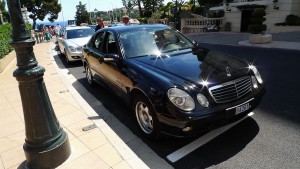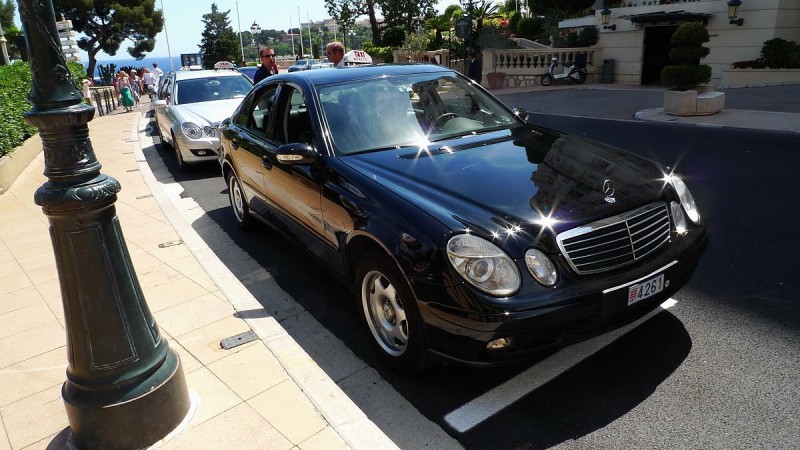French Lessons is delighted to welcome back the ever-engaging Philippe for his annual musings on what makes France, well, France.
“UberPop should be dissolved and branded illegal, and cars should be seized.” This recent declaration came from none other than Président François Hollande.
His words followed a week of violent protests in June when taxi drivers lashed out against the Uber suite of services that have cruised into this country. UberPop sees chauffeurs driving their own vehicles, while its taxi-servicing cousins UberX, UberBerline, UberVan and UberPool have different twists. The Ubers had France’s traditional taxi drivers blocking access to the country’s main airports and international train stations, destroying cars, smashing windows and sending several Uber drivers to the hospital.
“They’ve ambushed our car and are holding our driver hostage, “ singer Courtney Love tweeted from her Uber car on the way to Paris’ Charles de Gaulle Airport during this episode. “They’re beating the cars with metal bats. This is France?? I’m safer in Baghdad.”
The violence of the Uber brawl seemed to shock even the French, which is saying a lot for a culture that’s prone to descend on the streets and man the barricades at the slightest hint of change.
Change is difficult for everyone. Thanks to an increasingly complex system of laws, though, I am continually mesmerized by how well the French are able to prevent it. The Code du Travail is a collection of labour laws – over 600 articles in all – that runs to 3,000 tightly written pages. And this Code is but one of 61 French Codes that together stretch over 120,000-some pages. But I digress.
While local commentators deplored the show of force by some cabdrivers, they condemned L’Uberization even more. “The uberization of the economy is a godless and lawless development model,” wrote Jean Michel Bougereau in La République des Pyrénées. These are strong words – especially the godless part, given that Frenchmen have long abandoned their churches. The buildings now stand as crumbling monuments to the past.

Prime Minister Manual Valls chimed in along the same line against the violence. “This isn’t the law of the jungle,” he said. “Our society needs authority and rules.”
Um, let’s bring back Napoléon?
On a recent trip to the airport, I asked our ever-cheerful and high-heeled Christelle about the Uber situation. She operates not under a traditional French taxi license or the Uber scheme but with a VTC license (Voiture de Touriste avec Chauffeur – a car for tourists with a driver).
“C’est une superbe idée,” she said. It’s a great idea – and the French taxi drivers better adopt the Uber model or they’re dead. But Christelle did have one criticism. Uber is unfair competition because the drivers don’t have to pay all the social charges levied on taxi drivers.

These charges add up to a whopping 61% of the fare charged to clients. They begin with a traditional license, like one own by her husband Éric. He forked out 340,000 euros to the City of Antibes for the privilege of operating one of its 36 taxis in a town of 60,000 inhabitants during the winter – and over 120,000 during the summer. Talk about a monopoly! In Monaco, the same license would set you back 460,000 euros. But there the residents pay no income tax, so maybe drivers can afford it?
A 20-kilometer ride from Antibes to Nice Airport in an official taxi costs 80 euros. The same Uber ride sets you back only 30 euros. Now you know why! If you choose to go the high road, you must be lucky enough to reach a taxi driver in Antibes in the first place.
Here’s another law: No one from anywhere else can pick you up. Surely much ink has been spilled defining that hiccup within the nation’s taxi documentation. Then, assuming you are lucky enough to get a driver from your designated town, you still must hope he’ll show up on time, and that’s no guarantee he’ll help with bags or luggage – or even be half-courteous. Remember, there are only 36 licensed taxi drivers in Antibes. By comparison, there are three times as many taxis per capita in London and New York than in France. It’s hardly a surprise that when the French were asked during the Uber crisis for their opinions of the nation’s taxi drivers, over 60% gave them the thumbs-down.
Patrice Trapani, the Président of Taxis Niçois, Nice’s taxi organization, said he was shocked by these findings. (Really?) Shortly after the strikes, he declared in the local Nice Matin newspaper, “Nous, taxis, allons vers un suicide collectif.” We taxi drivers are moving toward a collective suicide! He did mention, however, that some drivers over-charge clients, refuse rides that are inconvenient, dress sloppily or simply aren’t helpful. His solution was to “mettre des gens sur le terrain pour controller les taxis” – to put more bureaucrats on the ground to control the taxis.
It’s so French! What about competition? I’d like to ask, even if I already can imagine his response: Ah, non, monsieur, pas de question. Nous avons des règles à respecter! It’s out of the question. We have rules to respect!
Taxis have been a monopoly in France since 1939, when the State introduced its first taxi laws. Today this monopoly is simply another way for the French State to extract tax money from its citizens and visitors. Taxi drivers are simply the minions. Come to think of it, it’s no wonder Président Hollande wants Uber banned!
Time to be fair. It’s not only France that has taxi monopolies. So does Germany, Italy, Spain, UK and Canada. France is hardly alone.
Peter Cheney, an investigative journalist, wrote a couple weeks ago in Canada’s national Globe and Mail newspaper that a taxi license in Toronto sold for C$ 360,000 in 2012, C$ 154,000 in 2013, and C$ 118,000 in 2014. Deflation? Hardly. The reason is Uber. “I discovered that almost none of the city-issued licenses – known as Plates – were in the hands of the working cab drivers,” Cheney wrote. “Instead, they were held by people who made others pay to use them.”
Uber fundamentally changes the equation in favor of the consumer. That is why it’s catching on around the world like wildfire.

One of the best books I’ve ever read is Sapiens: A Brief History of Humankind, by Yuval Noah Harari. The book, just published this year, argues that Homo sapiens rule the world because we are the only animal that can believe in things existing purely in our imaginations – notions such as gods, states, money and human rights. He goes on to explain why money is the most pluralistic system of mutual trust ever devised, and why capitalism is the most successful religion ever invented. He has a point on this last item. Shopping malls seem to have replaced churches as the place where people congregate in the 21st century.
Among these and other profound and erudite points, Harari also explains that the world is becoming not a more differentiated place, but a more homogeneous one. Countries and territories may be fragmenting before our eyes – Scotland, Quebec, Catalonia, Belgium, Greece, Yemen and Sudan come to mind as recent hotbeds – leading us to focus on the world’s dissolution. But taken from another angle, the volumes of today’s human rights laws are all more or less the same. English is becoming the globe’s shared language. Amazon, Google, AirBnB, Uber, Apple and Starbucks transcend frontiers; they are changing the rule books that have prevailed for hundreds of years. These companies, in fact, override national borders and ethos. Using them makes you a citizen of the world. Whether you’re in Paris, Tokyo, New York, Rio or Beijing, you can sip the same lattes, use the same phones, see the same movies and dance to the same hits.

So back to France. All of the country’s restrictive commercial practices – its monopolies over taxis, pharmacies, education and hospitals, for better or worse – will eventually succumb to Uberization. That’s what I think, anyway. Uberization is simply the cutting-edge word for another doozy of a term that’s been around for a while: mondialisation. But best not mention globalization to the typical Frenchmen.
It will be a long-fought battle in this country. This week it’s the éleveurs, the cattlemen, who are on strike. They want more money for their milk and meat products. Strikes are so commonplace that several websites dedicate themselves to the phenomena. People can make plans this way. C’est la Grève (“On Strike”) currently lists 13 strike actions from trains in Burgundy, Brittany and Aquitaine, to the emergency doctors in the town of Dreux and a strike by les Dames Pipi in Paris. This last one makes me laugh. These ladies look after the public toilets in places like Notre-Dame, the Eiffel Tower and Sacré-Coeur. They’ve been on strike since July 14th. If you’re touring around Paris this summer, be prepared to buy a drink at the nearest bar!
In the meantime UberPop stopped its taxi services in France. The organization awaits a favourable ruling from the country’s Constitutional Court, due in September, that would allow its operations to start again. Uber is also filing complaints in Brussels, attacking monopolies throughout France, Germany and Spain.

The fate Uber itself remains in the balance in this country. Despite the sweeping Uberization that is, bit by bit, chipping away even at the bastion of France, I have to think this society will clutch those things that remain really, truly and wholeheartedly the foundations of their culture. Cheese may be the last line of defense. We are still a long way away from a universal cheese like Cheez Whiz.
For that I must say dieu merci! And bon appétit.


Competition always results in shaking up the status quo, for better or worse. This was fascinating as I recall reading about the Uber upheaval in France- and now we have an insider’s analysis. Thanks!
Ah, so very interesting! The globalization aspect is a sorry thing to me since the variety of lifestyles is the fascinating thing about visiting different countries. So let’s hope France hangs on to the marvelous cheese and doesn’t succumb to Cheez Whiz, spreads or the cheese ball anytime soon!